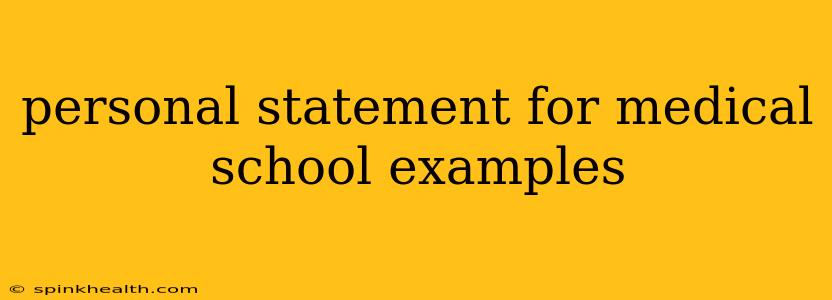Crafting Your Winning Medical School Personal Statement: Examples and Insights
The medical school personal statement. Just the phrase can send shivers down the spine of even the most accomplished pre-med student. It's your chance to shine, to tell your story, and to convince admissions committees that you're not just another applicant—you're the right applicant. But crafting a compelling narrative isn't easy. It requires introspection, honesty, and a deft touch. Let's explore what makes a great personal statement, using examples to illuminate the path.
Before diving into examples, let's understand the core elements:
- Show, don't tell: Avoid clichés and generalized statements. Instead, use vivid anecdotes and specific examples to illustrate your qualities.
- Authenticity is key: Your voice should be genuine and reflective of your personality. Don't try to be someone you're not.
- Focus on growth: Highlight moments of learning, challenge, and self-discovery. Admissions committees are looking for resilience and adaptability.
- Connect to medicine: Clearly articulate your connection to medicine and why you're pursuing this demanding career.
Example 1: The Unexpected Path
"The sterile scent of antiseptic never bothered me. Growing up, my grandmother, a vibrant woman battling a chronic illness, filled our home with the aroma of simmering herbs and the cheerful chatter of her many visitors. While her illness was a constant presence, it was her unwavering spirit, her determination to live fully despite her limitations, that sparked my interest in medicine. It wasn't the glamorous image of a doctor, but the quiet acts of compassion and the unwavering dedication of her medical team that resonated with me. This early exposure shaped my understanding of medicine not as a science alone, but as a deeply human endeavor. My journey to apply hasn't been straightforward – a year spent volunteering on a Navajo reservation broadened my perspective and highlighted the disparities in healthcare access. Through those experiences, I realized the power of empathy and culturally sensitive care, and I'm eager to contribute my skills to bridge these gaps."
What makes this example strong?
- Specific anecdote: The grandmother's illness serves as a compelling hook.
- Focus on growth: The volunteer experience demonstrates a broadened perspective and commitment to service.
- Clear connection to medicine: The statement explicitly links personal experiences to the applicant's desire to pursue medicine.
Example 2: Overcoming Challenges
"My fascination with the human body began not in a textbook, but in the operating room. Observing my father, a surgeon, navigate complex procedures with precision and grace solidified my desire to pursue a career in medicine. However, my path hasn't been without its obstacles. Struggling with dyslexia throughout school forced me to develop strong organizational and time-management skills. Learning to advocate for myself and find innovative ways to overcome academic challenges instilled in me a resilience that I believe is essential for a successful medical career. This experience taught me that perseverance, collaboration, and seeking help when needed are equally crucial to success as inherent talent. I’m confident that my ability to adapt and overcome challenges will serve me well as a future physician."
What makes this example strong?
- Honest portrayal of challenges: Acknowledging dyslexia adds depth and credibility.
- Emphasis on skills gained: The applicant effectively highlights the positive aspects of overcoming adversity.
- Direct link to medicine: The applicant connects their challenges and resilience to their suitability for medical school.
Example 3: The Power of Mentorship
"The intricate workings of the human body have captivated me since I was a child, fueled by the inspiring mentorship of Dr. Ramirez, my high school biology teacher. Her passion for science wasn't just contagious; it ignited a desire within me to unravel the complexities of life itself. Working in her research lab, I discovered a love for scientific inquiry, mastering techniques and contributing to a study on…[specific details about research project]. This experience not only solidified my commitment to a career in medicine but also honed my skills in critical thinking, data analysis, and collaboration. I'm particularly interested in [specific area of medicine] and hope to contribute to advancing knowledge in this field."
What makes this example strong?
- Specific details: The mention of a research project adds credibility and shows tangible accomplishments.
- Focus on mentorship: Highlighting the impact of a mentor provides context and strengthens the narrative.
- Clear career aspirations: The applicant clearly articulates their specific interests within medicine.
How to Answer Common PAA Questions in Your Personal Statement (Subtly):
While you shouldn't directly answer "People Also Ask" questions as headings, you can organically weave their themes into your narrative. For instance:
-
"What makes a good medical school personal statement?" This is implicitly addressed through the examples above, focusing on authenticity, storytelling, and demonstrating growth.
-
"What should I write about in my medical school personal statement?" The examples highlight diverse topics—overcoming challenges, mentorship experiences, and impactful volunteer work. Your topic should reflect your unique experiences and aspirations.
-
"How long should a medical school personal statement be?" While the length varies slightly by institution, the examples demonstrate the importance of conciseness and impactful storytelling over sheer word count.
Remember, your personal statement is a reflection of you. Take the time to explore your experiences, identify your strengths, and craft a narrative that is both compelling and authentic. Use these examples as inspiration, but let your own unique story shine through.

